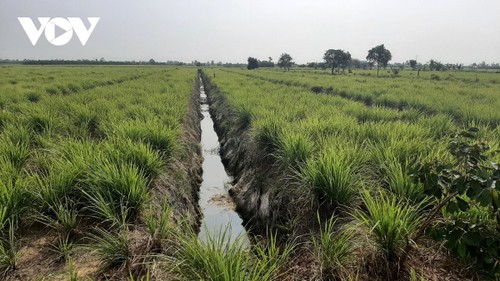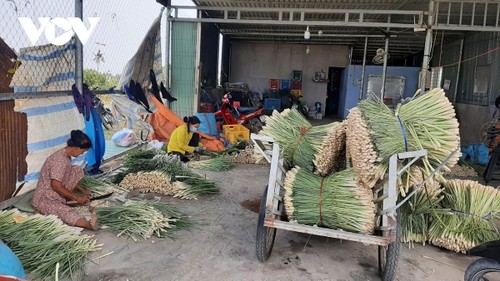 Lemon grass is suitable to be grown coastal areas. Lemon grass is suitable to be grown coastal areas. |
Lemon grass has been grown in the acid and saline soil of Tan Phu Dong Island for nearly 20 years and the area under cultivation has increased each year.
Tan Phu Dong now has more than 2,300 hectares, making it the largest lemon grass-growing area in Tien Giang province.
Lemon grass grows in coastal areas with higher quality and greater productivity than in other areas. One hectare earns 4,400 USD per year, 2 to 3 times as much as rice farming.
Dao Thi Diem Thuy of Phu Thanh hamlet in Tan Phu Dong district says her family is better off thanks to growing 2 hectares of lemon grass.
“A kilo of lemon grass sells for 26 cents, three times as much as in the past. We make a profit if we can sell a kilo for 22 cents. We used to grow bananas and other crops. Growing lemon grass on saline soil is highly productive, and our life has significantly improved,” said Thuy.
Lemon grass is easy to grow even in dry weather. It requires less investment than other crops, but can be harvested all year round.
The plant is popularly used for flavoring food and extracting essential oils and medicinal materials.
According to Nguyen Van Doan, Secretary of Phu Thanh commune’s Party Committee, “Lemon grass is the main earner of Tan Phu district, and particularly Phu Thanh commune. Our orientation is to help growers apply safe standards like VietGAP and GlobalGAP in cultivation and processing.”
Doan added, “The Phu Thanh commune cooperative is training its members and linking them with other producers. We’ll work with the Vietnam Gardening Association in the South to provide a support program on using organic fertilizers and production methods efficiently.”
With 1,800 hectares of cultivation and a safe organic production method, the Phu Thanh commune cooperative considers lemon grass a key crop for branding.
 A facility to buy lemon grass in Phu Thanh hamlet, Tan Phu Dong district A facility to buy lemon grass in Phu Thanh hamlet, Tan Phu Dong district |
Nguyen Van Hai, head of the agricultural and rural development section of Tan Phu Dong district, said, “We’ll expand our lemon grass area to about 4,000 hectares this year. Rice farms with low productivity will start growing lemon grass instead.”
“We’ll develop a collective economy in which cooperatives will play a key role in linking material inputs and product outputs. We’ll extract essential oil and make anti-mosquito incense from lemon grass,” Hai explained in more details.
The Tan Phu Dong district Farmers' Association is supporting technology transfers and distribution links to help citronella growers maximize their profits. Local farmers are expanding their area of cultivation, creating more jobs, and improving their standard of living.